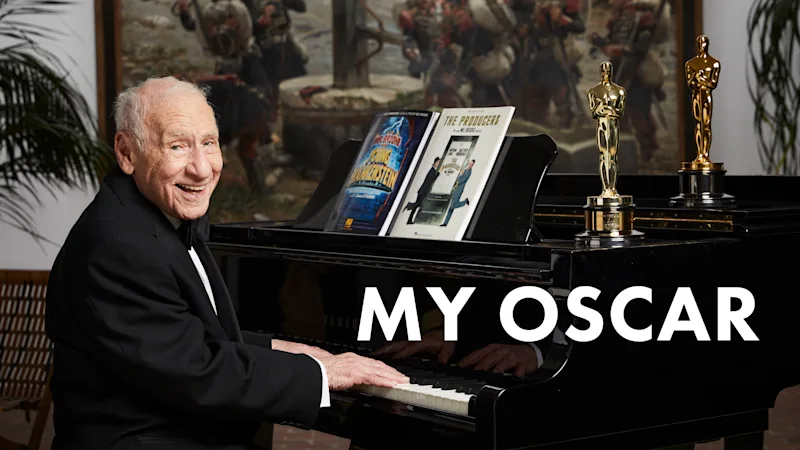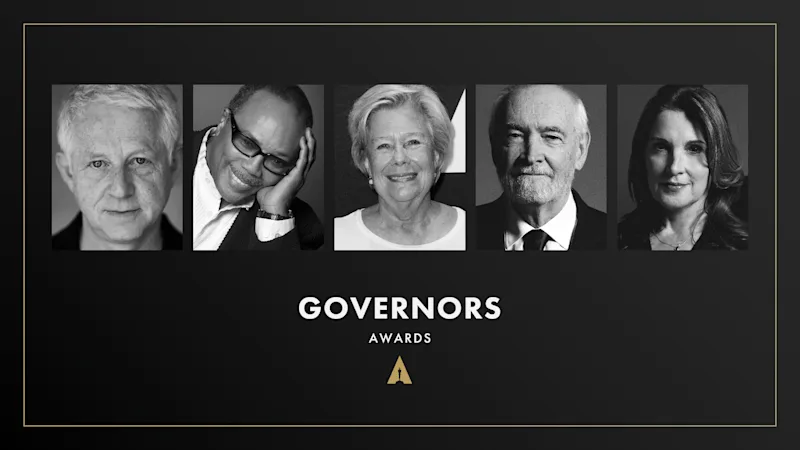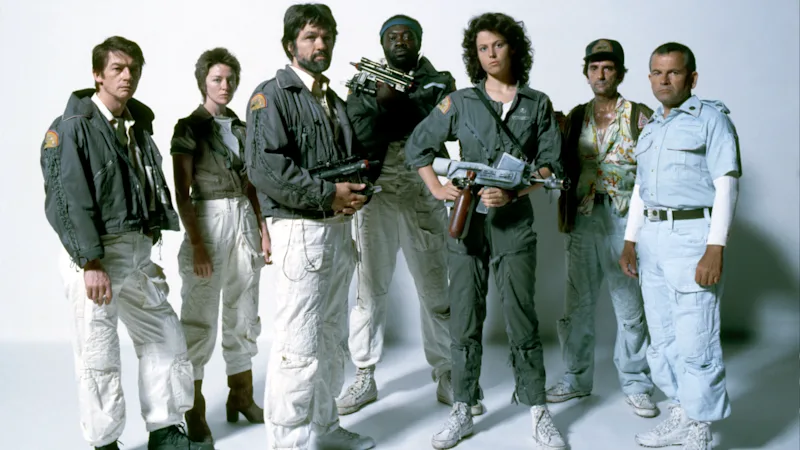Jerskin Fendrix had never composed a film score when Yorgos Lanthimos reached out to commission original music for his phantastic fairy tale, Poor Things. At that point, the former Cambridge student had one album to his name, an experimental pop record entitled Winterreise, but it was enough to convince the Greek auteur that Fendrix was the right guy for the job.
Now, the first-time film composer is also a first-time Oscar nominee.
Fendrix, the stage name of Joscelin Dent-Pooley, began writing music for Poor Things before filming began, composing significant portions of the score based purely on Tony McNamara's script and various concept art. The film centers on Bella Baxter (Best Actress in a Leading Role nominee Emma Stone), an adult woman who is brought back to life using the brain of a baby immediately after jumping to her death. Having been reanimated by a highly unorthodox scientist, Bella must build her life anew starting from a childlike state.
"I was trying to interpret human emotion and human experience in a way that was a little more subversive, but the intention was always to make it honest and feel really genuine," says Fendrix. "This just makes me feel like I've hopefully achieved that as best as I could have."
The this in question is his nod for Best Original Score. (At the 96th Oscars, Poor Things received 11 total nominations, including Best Picture.) Of the recognition, Fendrix admits, "I've not really had a proper chance to process it, to be honest." But in conversation with A.frame, the composer breaks down his singular score and the inspiration he took from — amongst other things — medical research and classic Disney movies.

A.Frame: There's a vivid absurdity and an abstract element to Poor Things that could be difficult to write music for without it seeming too much. How did you want the score to complement or balance the visuals?
Yorgos asked me to do the music in the first place because what I had already released was quite absurd and stupid, so I was the right man for the job. It was an odd initial process trying to work out what the correct contribution could be. Firstly, because there was no reference point. We decided not to discuss any other composers, film scores, or music in general, because it was essential that the musical identity of the film had to be exclusive to Poor Things. It involved me working out what tools I already had and what processes I had already come up with to convey specific emotions, feelings, or concepts. I think music is great at hitting the emotional core very quickly and without much thought or interpretation. That is really important, and it was a great starting point to try and work out how my work could compliment what the designers, cinematographers and so on were doing. It involved great contemplation.
You said you didn't discuss other works or composers, but there are elements of the score that almost feel like subconscious homages. One example is the ending sequence, which feels very classic Hollywood, and another is the reanimation sequence, which feels like something out of a Universal Monster movie.
I think the ending, to some extent, definitely has an element of the very old, classic Disney films, which I love. Many of those go through this process at the end where they do a condensed, rapid overture, basically. For instance, in Pinocchio, there is a moment where "When You Wish Upon a Star" flows into this other thing, and it's this hyper-concentrated version of the whole score. It was really important that the ending didn't have any ambiguity. It was a happy ending, and it wanted to have that feel. So, I definitely think I took a lot of cues from those early Disney scores, which are historic and wonderful.
Outside of that, there wasn't too much of an external touchstone. A lot of the decisions for what melodies and sounds I wanted came from a contemplation on what the themes were, what the script embodied, ideas about the progression of life, and even different medical things. I spent a while at the Wellcome Collection, the medical research library in London, looking at technically contemporaneous surgical documents and trying to think about what ideas I could get from that. The process of coming out with a sound like this involves a lot of research and thought about how to implement that abstractly. I was also thinking about trying to empathize with characters who are almost impossible to empathize with, because it's such an insane plot! Bella is experiencing everything for the first time because she's a kid, so what did it feel like when your first pet died? It was things like that.
What ideas did you get from doing that medical research?
The link between that research and the score gets into a cloudy, indefinable territory, which I'm not entirely able to verbalize, but I wasn't out there collecting field recordings. I also wasn't trying to take information from documents and sew in the information as a notation, even though that's very common with a lot of experimental music. This would be a very difficult part of the process for me to describe. I had a very academic upbringing. Both my parents were academics, so I know what research and what that sort of information feels like. It's not a thing that I factually apply, but it is a thing that is in my blood and integral to me due to the circumstances in which I was brought up. It's an excellent raft to access certain artistic impetuses, if that makes sense. [Laughs]
The piece of music that we hear in the opening of the film — where Victoria, who becomes Bella following the brain transplant, jumps off of the bridge — sets the sonic tone for the entire film. Was that also one of the first pieces of music you wrote for this, or did it come later?
Those four notes at the very beginning of the film came very early on. As instructed, I read the script for the first time before the book. How everything unfolds and the deep mortal horror by the end — when Bella is visiting Victoria's house and finds out why she killed herself — how that unfolds is so masterful and unnerving. I don't know how directly I was thinking about it, but I wanted those four notes to create a shadow over the whole thing. When you see Victoria falling, the notes are piercing and clear at the beginning, but there are so many parts of the score where the four notes wriggle underneath. They're not that obvious, but there's this general shadow over Bella's whole story.
You lean heavily into strings with this score and prove just how versatile they can be. They can be warm and expansive, or as you say, quite piercing and intense.
I love the things you can do with the tone and the tuning of strings, and the number of strings you can have at one time allows you an incredibly wide spectrum of different consonances. Especially at the beginning of the film, there were very high strings and bent glockenspiels, so all small, high-pitched voices. There was a lot of cute stuff that could be sweet but also wobble and be slightly off, which is very vulnerable. It was important to me that the score didn't have too much of a sense of feeling polished or objective. It needed to be naive, so I used whichever orchestrations and productions I thought best suited that feeling, maybe something more honest.
The locations in Poor Things are treated as characters, whether that be London, Paris, Lisbon, or wherever. Did you write to that or use the varying locales as a jumping-off point to different sounds?
I think it was a mix of both. There are so many locations, and the way the whole thing is structured is like a morality play. Bella goes to a new location, this is her experience, and this is how it contributes to her evolution as a character. So, I was framing these episodes more of the development of her soul, rather than just a new exotic place she's going to. I really, really, really didn't want the music to reflect the music of the location or the culture of the location. But Alexandria, which is the first time she is faced with horrifying stuff, needed to have a piercing, very visceral, inelegant, cutting sense of trauma. Lisbon has a great sense of wonder and discovery. From reading the script, I was so immersed in this headspace of what the film looked like and felt like I started writing things automatically.

There are also numerous scenes in Poor Things that have absolutely no soundtrack or orchestration whatsoever. In your conversations with Yorgos, what was the method of deciding where you would write music and where you would leave it dry?
Yorgos knows what he is doing, and he has a certain sense of how the film's vision should pan out. He had a really strong sense of that from the beginning, but the fact that I wrote so much of the music before he started filming was helpful. Maybe that allowed him to internalize it a bit more and think in advance about whether something would be appropriate or not. Some of the changes we made in collaboration with Johnnie Burn, the sound designer, had to do with how prominent the music should be in some elements. There are parts where it's important that it is more ambient and atmospheric — more in the background — and then there are some points where he stripped away all of the sound design so the music would effectively look you directly in the eye. That reinforced what was already a pretty intensely mixed and intensely produced soundtrack.
This score earned you your first Oscar nomination. How do you feel about that?
It's a very unusual film that all of us, from every department, worked extremely hard on and feel emotionally attached to. I think that comes across. When we all found out we were nominated, and that we were in 11 categories, there was a sense of mutual pride. The amount that we've interacted with and inspired each other as craftspeople, writers, actors, and so on was really important to Poor Things' success. It's a film that could have easily gone in the wrong direction, and the thing that holds it together is how much heart you can tell is behind it. I'm very happy that the work is being recognized, because it highlights what went into it.
A.frame, the digital magazine of the Academy, is excited to celebrate and honor the nominees of the 96th Oscars across several branches by spotlighting their nominated films, craftsmanship, and personal stories. For more on this year's nominees, take a look at our Oscars hub.
Editor's Note: For parity, A.frame reached out to every nominee in the Best Original Score category for an interview.
RELATED CONTENT:
'Poor Things' Composer Jerskin Fendrix's Top 5
Emma Stone Knows She Might Never Play a Character Like Bella Baxter Again (Exclusive)
'You Have to Go Beyond Your Limitations': Breaking Down the Craft of 'Poor Things' (Exclusive)







